Groups

Pulp and Paper Mills
About the group Pulp and paper mills as they were
Created 10 December 2014

Chris |
||
|
The mill, that made quality printings and writings, shut 1 April 2015 shortly after opening a new CHP plant.
Links 2016 http://www.tullisrussell.com/our-company/our-history.html The archives https://canmore.org.uk/site/333622/glenrothes-auchmuty-machine-house-4 Great audio: https://standrewsrarebooks.wordpress.com/2015/12/10/reading-the-collections-week-40-tullis-russell-oral-history-collection/ |

Chris |
|
|
Founded 1873.
Owned by White Pine Co; William Haig; Culter-Guardbridge Holdings; G.B. Papers Plc; James River Corp.; Curtis Fine Papers In 1923 Five machines, one 96 ins., two 92 ins., one 84 ins., and one 72 ins. making Tub-sized: Air-dried Writings, Ledger, Envelope, Drawing. Linen-faced and Cartridge Papers. Engine-sized: Writings and Envelope Papers, Silurians, Tinted Writings and many more. In 2008, when it closed there were still four machines. |

Chris |
|
|
J A Weir commenced the production of fine papers using esparto grass pulp in 1875, and by 1896 had formed the limited company, J & A Weir Ltd. Kilbagie began supplying Gestetner in the early 1920s, who, in 1965, bought J & A Weir Ltd and began modernising the mill. After operating under the name of Gestetner from 1969, the business was bought by the Pratt Group of Melbourne, Australia, and traded under the name of Weir Paper Products Ltd until its acquisition by Inveresk plc in 1995. Inversk announced the closure of Kilbagie in 2001. The machines shut but the deinking operations were purchased by Leicester Paper Co but the site was closed in Jan 2005.
|

Chris |
|
|
Dartford Paper Mill was founded 1862 by Ettrick Forest Mill.
There were a series of owners: Kennet Paper Co. The Daily Telegraph, Inveresk, Wiggins Teape, Arjo Wiggins. Excise Mill No 1. In 1923 it was known as "Daily Telegraph" Paper Mills. Five machines, two 94 ins., one 100 ins., one 112 ins., and one 134 ins. News in reels or reams. Ordinary and Supercalendered. Also Imitation Parchment and Bank Papers. Output about 20,000 tons per annum. Closed by Arjowiggins in 2009. The Greaseproof Mill was founded in 1933. Also owned by Wiggins Teape it closed in 1957. |

Chris |
|
|
Wm. Sommerville & Son setup the mill in 1837.
In 1923 two machines, 85 ins. and 100 ins. powered by both water and steam, making Fine and Featherweight Printings. E.S. Writings and Envelope Papers. Became part of Curtis Fine Paper (1967?) but closed in 2004. http://www.penicuikpapermaking.org/dalmorem.html |

Chris |
|
|
Founded 1751.
In 1923 three machines, 96 ins. 72 ins. and 63 ins. making Writing and Envelope Papers, Printings and Plate Papers, Cartridges, Imitation Parchment, Opalines, Ivory Boards, White Pulp Boards. Tinted Papers, and Tinted Pulp Boards, Chromo and Art Papers of every description, Clothlined Papers, Manilla Boards, etc. Closed 1965 |

Chris |
|
|
Owned by Brittains.
In 1923 six machines making Pottery and other Tissues, Specially Prepared Duplex and Simplex Lithographic Transfer Paper, Cigarette Papers, Stereotyping Tissues, etc. Closed 1979 |

Chris |
|
|
Founded in 1848 by Robert Craig who also owned the large Moffat Mills, south of Airdrie.
In 1923 there were three machines, 106 ins., 78 ins., and 74 ins. White, Coloured, and Duplex Plate Blottings and Papers, Filter Papers, Wall Decoration Papers for Embossing, Post-card Papers, Duplex Boards and Pressings, Insulating Papers, Cover Papers. The Caldercruix mills had at one stage four paper-making machines, of which two were in operation when papermaking ended on 7 June 1971 still owned by the same company. |

Chris |
|
|
Founded in 1845 by Potter & Co. to make base paper for their wallpaper printing business.
Potters was a founding member of the Wall Paper Manufacturers, Ltd. in 1899. In 1923 there were four machines, one 90 ins., one 72 ins., and two 68 ins. steam powered making E.S. Writings, Cartridges, Long Elephants, White Printings, and M.G. Litho. In 1970 mill was part of Reed Paper Group and was later sold to St. Regis which became DS Smith who shut the mill in 2012. |

Chris |
|
|
Papermaking started around 1804 by Fourdrinier (H&S) & Gamble.
Sold to Matthew Toogood in 1808. Shut and reopened several times before becoming St. Neots Paper Mill Co., Ltd. in 1888. By 1923 two machines, one 69 ins. and one 60 ins. using both water and steam. Products were: T.S. Superfine Writings, Banks, Loans, Charts, Drawings, Fine Envelope Papers, Typewriting Papers (Plain and Tinted), etc. Stopped paper making paper 1939 except Wiggind Teape move production from Dover during WW2. Leased to Samual Jones 1950 manufacturing gummed labels. http://www.bernardoconnor.org.uk/Publications/Stneots/Industrialdev.htm |

Chris |
|
|
Wall Paper Manufacturers Ltd started making paper here on 26 Dec 1908 with labour from their Lancashire mills.
In 1922 it was taken over by Associated Press under the name Empire Paper Mills, Ltd. By 1923 there were six machines one 142 ins., one 138 ins., three 90 ins., and one 56 ins.. Still manufacturing newsprint and other grades - Esparto, Supercalendered and M.F. Printings, Lithos, Imitation Arts Pastings, Coatings, Body Papers, M.G. Litho. and Fine News, Poster Papers, Antique Book Papers. Later sold to A.E. Reed which became Reed Paper & Board. when the products were much more varied. Also called Ingress Abbey Mill. By 1975 down to 2 machines mill shut in 1992. Source for some data http://kentrail.org.uk/empire_paper_mills.htm |

Chris |
|
|
Top left of picture Coltrop Board Mill. Taken over shortly after by Reed P&B and expanded over the canal.
1923 Three machines. Steam and water power. Caps, Royal Hands. Hand and machine-made Paper Bags, Brown, Blue, and Grey Wrappers, Carpet Felt Papers, and Roofing Fibre. 200 tons per week. Closed 2000. |

Chris |
|
|
Stowford Mill started producing paper in 1787. It owners have been Wm. Ackland; Allen (John) & Sons ,Portals; Wiggins Teape; Arjo Wiggins.
In 1923 the owners were Allen (John) & Sons (Ivybridge), Ltd.,; it had two machines, 72 ins. and 68 ins. making Fine and Superfine Writings, Vellums and Banks, Book, Envelope and Cartridge Papers, Blottings, Tub-sized Air-dried Rag Papers at 2,000 tons per annum. It closed on 1 Dec 2013 |

Chris |
|
|
Paper making started in 1736. Owned by Inveresk until 2010 now a private company making high quality artists papers and ink-jet printing papers.
1923 Owned by Pirie, Wyatt & Co., Ltd. Excise Mill No 364. |

Chris |
|
|
Albert E Reed started paper manufacture in Upper Tovil Mill in 1893.
Excise Mill No 312 In 1923 there were four machines, 100 ins., 84 ins., 82 ins., 70 ins., and 60 ins. making Fine News, Printing, Super-calendered Papers, Cartridges, and Imitation Parchments. Mill was shut in 1983. |

Chris |
|
|
Established 1845 by John Dickenson.
1923 making Chromos and Art Coated Papers and Boards, Coated Box Boards and Cloth-lined Boards. Water and Steam Powered Closed 1980 |

Chris |
|
|
Started paper-making in 1836. Owned by Vint Hutton & Co; Hutton Fletcher & Co; J. Blackwell & Co; Ford Paper Works; Wiggins Teape; Alex Pirie & Sons.
1923 Four machines, 100 ins., 90 ins., 72 ins. and 60 ins. E.S. Writings, Printings, Fine News, Music and Cartridges. Closed 1 Jun 1971 |

Chris |
|
|
Also known as Hayton Mill it started making paper in 1893.
Owned by Donside Paper Co. and UK Paper Co. it specialised in fine papers. It closed in 2001. |

Chris |
|
|
Founded in 1648 by Hugenot refugees. The paper mill replaced an earlier corn mill. In 1882, it is recorded as having a waterwheel 18 feet 3 inches (5.56 m) by 8 feet (2.44 m). The mill suffered two fires in the 20th century but was rebuilt.It was working until 1952 but has now been demolished.
https://en.wikipedia.org/wiki/River_Darent#Eynsford_Paper_Mill 1923 Owner Arnold & Foster Two machines; 8 vats. Hand-made and Mould-made Papers, Extra Superfine Account Book and Writing (water-mark " Fellows "), Superfine Account Book (water-mark " Arnold "), Loan, Bank, Bank Note, Special Water-marked Papers, and Special " Unbleached Arnold." Drawing and Printing Papers. Output, 16 tons weekly. Excise Mill No 330 |

Chris |
|
|
Established 1912 by Associated Press to make newsprint. Later sold to A. E. Reed which became Reed International.
Diversified products. Shut 1978 |

Chris |
|
|
Known as Bridgewater Mill. Built 1934 owned by Bowaters Paper Co; AbitibiBowater.
Produced Newsprint Shut 2010 |

Chris |
|
|
Established 1750. Owned by Basted Paper Mills Co, Wiggins Teape and Co. (1919) Ltd.
1923 Two machines. Manufactured Superfine Writings. Bank, Loan, Drawing and Ledger Papers, Typewritings, Chart and Map Papers, Lithographic Papers, Bank Note Papers. Special Watermarks. Closed 1949 https://bgphotos.wordpress.com/theme/basted-2/mill-history/ |

Chris |
|
|
Rare view of site.
Established 1892 Owned by Killner Partington Paper Pulp Co, Barrow Paper Mills, Ltd. Shut 1973 |

Chris |
|
|
Established 1809
Owned by John Dickenson; Dickinson Robinson Group; Bowater Shut 1999 |

Chris |
|
|
Established about 1820, Owned by Marsden (Chas.) & Sons; Charles Briggs; Alliance Alders; Smurfits.
Shut 1993 |

Chris |
|
|
Specfic view of West Mill
|

Chris |
|
|
Built in 1914 the Inveresk Paper Company purchased Caldwell’s in 1928: at that time, the mill had four machines, but a fifth one was added in the same year. Following a short boom for the Scottish paper industry, the mill began a rollercoaster journey which continued for the next 70 years. It closed its gates for the final time late in 2003 with a loss of 150 jobs, with the machinery being returned to Inveresk.
|

Chris |
|
|
Ford Mill operated from 1836 until 1971,when it employed more than 400.
|

Chris |
|
|
Possibly a descendant of a Domesday Book mill Having passed through a number of uses it was converted to a paper mill around 1730. Certainly, there was a paper mill here in 1738. London, General Evening Post, May 18th 1738.
A very good new-built Paper Mill, situate and being in the Parish of Chartham, where is plenty of Water, two Miles distant from the City of Canterbury, built by Peter Archer, lately deceas'd, containing two Engines, two Fats (vats), and all the other utensils and conveniences fitting and necessary for the making of Paper; together with a very good Dwelling-house adjoining to the said Mill.... Chartham turned to tracing paper production in the 1930s, as part of a strategic aim to replace German supplies in the event of war. Expanded in 1949, Now, with a production of 10,000 tons/yr of translucent paper out of a total output of 15,000 tons/yr, it is one of the world's largest - if not the largest - suppliers of transparent medium. |

Chris |
|
|
About the year 1777, a man called Ingram Horne took over an established a paper mill at Buckland. After a chequered history there was a major fire in September 1887.
To help the mill get back on its feet after the fire, Henry Hobday secured the order to make ‘Conqueror’, watermarked business stationery, from London paper merchants Wiggins Teape, in 1888. ‘Conqueror’ was an immediate success, being perceived as much superior to existing business stationery. So, to ensure continuity of supply, Wiggins Teape bought Buckland Mill in 1890. Production of Conqueror continued until the mill was shut in June 2000. See http://www.dover-kent.co.uk/places/buckland_mill.htm |

Chris |
|
|
Showing significant growth after only 10 years. Now, 2014, the largest recycled fibre mill in Europe.
|

Chris |
|
|
Now, 2014, the largest recycled fibre mill in Europe.
|

Chris |
|
|
Paper was being manufactured at Dinting paperworks, to the west of Glossop, by 1835, the mill having been built as a cotton spinning mill in the early 1800s. By the 1860s there were at least two more in the area (Schmoller 1994).
Manufacture initially used rags, straw, jute and esparto (Anon 1936). A number of successive owners had gone bankrupt in the paper-making business; however, two empty paper mills at Whitfield were taken over by manufacturers from Bury to develop a new paper-making process. Experiments were successful and expansion began in 1882 to devel op the large paper-making complex known as Turn Lee Mills (SMR 6146; Hanmer & Winterbottom 1991) http://archaeologydataservice.ac.uk/archiveDS/archiveDownload?t=arch-881... See also http://www.glossopheritage.co.uk/turnlee.htm |

Chris |
|
|
Dalmore, ‘Last Mill on the River Esk’
Wm. Sommerville & Son was the last papermaking company to set up on the River Esk. Formerly a meal mill, work started on the construction of the papermill at Auchindinny in 1835. By the time it closed in 2004 it was producing 10,000 tons a year of high quality paper and providing direct employment for 120 people. http://www.penicuikpapermaking.org/dalmorem.html |

Chris |
|
|
Operated between about 1859 and 2006 the mill produced MG papers for bags and envelopes. Eventually virtually all recycled fibre was used.
|

Chris |
|
|
The mill went into production in 1874. As the mill developed the village grew around it, with new housing and roads to attract and accommodate workers. Before the First World War the labour force reached over 400, reaching a peak of 620 in the late 1950s.
The paper mill was previously the main local industry and was operated by Curtis Fine Papers. On July 24, 2008, the mill went into receivership and 180 workers were made redundant. Wikipedia entry for Guardbridge village. |

Chris |
|
|
Valleyfield Mill - the first paper mill on the River Esk
see http://www.penicuikpapermaking.org/valleyfieldm.html Papermaking was started at Valleyfield, Penicuik in 1709 by Sir John Clerk of Penicuik, Valleyfield closed on 1 August 1975, ending 267 years of papermaking. |

Chris |
|
|
1873 Company founded.
1925 Private company. 1961 Manufacturers of power and telephone cable insulating papers, pressphans and other electrical specialities, base papers for abrasive, plastic base and other saturating papers, creped speciality papers for electrical insulation, impregnation coating and packaging, template board, jacquard card material, Atlas label and envelope manillas, Husky white and tinted manillas, Standard buff manilla, airmail envelope papers, oiled and plain tympans, multiply papers made from extra strong fibres. 500 employees |

Chris |
|
|
Airthrey Paper Mill was in operation in 1795 under the ownership of James McRobie. There were two papermills at Airthrey, Bridge of Allan, Stirlingshire in 1825. Both belonged to James McRobie. In the 1832 list mills 2 & 3 appear both owned by McRobie, but 1 is not listed. In 1845 John McRobie transferred his papermaking machinery from Airthrey No.3 to Airthrey No.2. In the 1852 list only one of the three survives (No.2), and has passed to H. Henderson & Co. Spelt Aithry Glas Dir 1809.
|

Chris |
|
|
Three mills for one. All Inversk
BVPM produced "parchment" by a heavily beating fibre to make the paper and then treating with sulphuric acid. Developed here by Inversk later Wiggins Teape. Kent Kraft was centred here making sacks for the local cement industry. |

Chris |
|
|
St. Andrew Mills Ltd., makers of paper and paper goods such as tissues, opened in 1932 in St. Andrew Road, Walthamstow. A factory was built near the mills in 1949. In 1955, when the mills were taken over by Bowater-Scott Corporation Ltd., there were 400 employees.
|

Chris |
|
|
Established in 1862 as Ettrick Forest Mill. Taken over in 1868 by the Daily Telegraph and name changed to Dartford Paper Mills. Newsprint was produced for the Fleet Street presses and with up to 700 staff were employed.
The mill later passed into the ownership of Wiggins Teape and paper production continued on the site until 2009 when it was closed and demolished. |

Chris |
|
|
Horton Kirby Mill was last of many on the River Darent. Rebuilt 1840 shut 2003.
|

Chris |
|
|
Just before the large post-war expansion. Most production in "East Mill" but one machine in West Mill,
|

Chris |
|
|
Well developed after 10 years of operation mill was already on both sides of the railway
|

Chris |



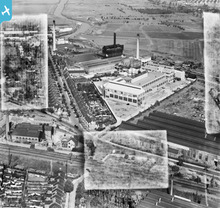

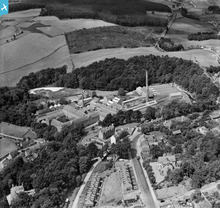
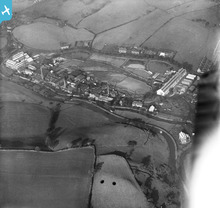
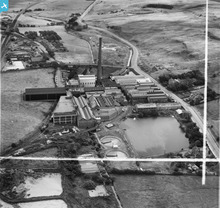


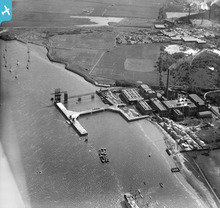

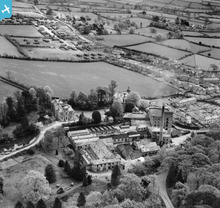

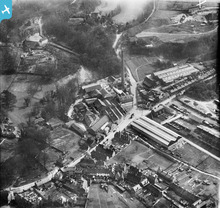

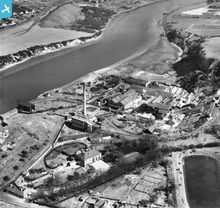
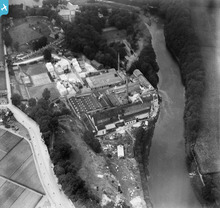

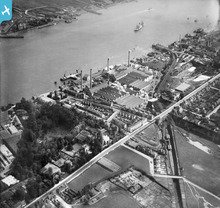
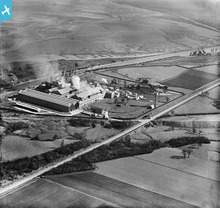




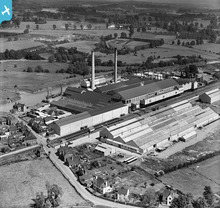

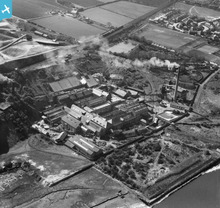






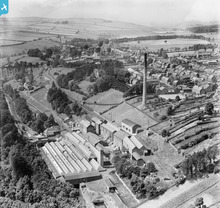

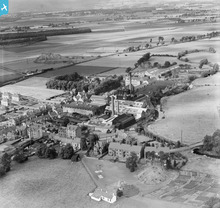
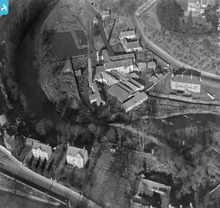





see image record